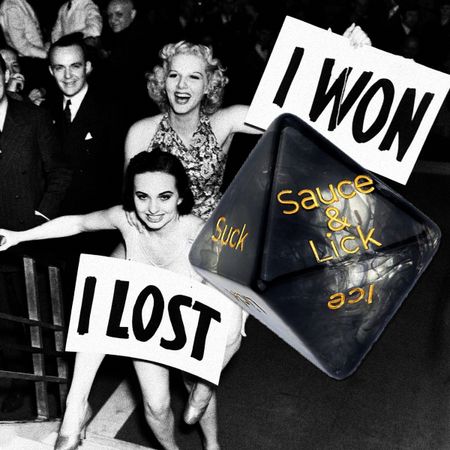Living with a Crazy Husband
He was charming — irresistible — until he became unbearable. One woman's trip to the dark side and back.

Between January and May of 2006, my husband, Leopold, attempted suicide four times, at nearly regular intervals of five weeks. In June, he disappeared for a month. When he re-emerged, he announced he was quitting me, his job, and the city in which we lived. He was going to teach at a high school in Appalachia.
Just two years prior, we'd met at a mutual friend's birthday party and secluded ourselves on the fire escape, smoking. I lived in New York; he was in D.C. The following Saturday, we talked on the phone for six hours. I visited him two weeks later. Over the weekend, he asked me to move in with him; by Sunday night, we'd picked out the names of our unborn children. Like Tristan and Isolde, we were bewitched by each other. Leopold proposed to me four weeks after that.
My friends thought it was impetuous of me to go along with this breakneck courtship — especially since the ink was barely dry on my divorce from my first husband — but I could not be dissuaded. This was my lifelong image of what love should be like, and I was eager to start afresh.
Only later, after meeting with Leopold's shrinks, did I understand that this wasn't romance — it was a disease. Specifically, it was a symptom of the manic side of "manic-depressive illness," also known as bipolar disorder.
Like many bipolar sufferers, Leopold had gone his whole life without being diagnosed. The mania was seen as part of his personality. He was a consummate romantic, showering me with flowers and surprises. We loved each other to excess. He would say he missed me if we were in two separate rooms of the apartment.
Where I should have seen signs of a problem, I saw lovable quirks. Leopold was able to envision the distant future (like knowing what those unborn children would major in at college). But the short-term future — anything more than a few months in advance — eluded him. He had written the first 50 pages of a novel seven years earlier — but he'd bristle if I pressed him about finishing it.
I attributed tendencies like these to a combination of Gen-X apathy and traditional male immaturity. He once told me, "I'm the best damn writer in the world." But he was unable to take concrete steps to test his abilities. (I later learned that hyperconfidence is also a sign of mania.)
Stay In The Know
Get exclusive access to fashion and beauty trends, hot-off-the-press celebrity news, and more.
What he couldn't plan for tomorrow, Leopold had no trouble determining for today: Shortly after our wedding, he decided to buy a car. His parents offered him advice on finding the best deal, negotiating the financing rate, shopping around. Leopold left for the dealership at 2 p.m. At 5 p.m. he drove home with a new car. His parents gave him a tongue-lashing for his impulsiveness. He flopped on the bed and told me, "I want to hurt myself."
All honeymoons end; in our case, it ended almost before it began. We often fought about his job, which required him to spend half his time in a Middle Eastern country that was on the State Department's unsafe list. He said, "Everything in my life has been leading up to this job. If you deny me this, you deny me everything." I didn't know how to respond to that kind of extreme, unchecked zeal.
The funny thing is, for most of the time we were together, it was my mental health with which we were preoccupied, not his. Full disclosure: I am bipolar, too. I was diagnosed with bipolar type II years ago. In type II, the manic and depressive episodes are distinct from each other and relatively easy to recognize. It was strangely fortunate that my depression was so pronounced — I cried constantly, had an irrational social phobia, and didn't brush my hair for months at a time — because it allowed me to seek help at an early stage.
Leopold, meanwhile, was bipolar type I. His manic episodes were much more pronounced than the depressive ones. Many bipolar sufferers don't seek treatment because the manic side, which in mild stages resembles euphoria, is actually enjoyable. But euphoria can be terribly dangerous. Bipolar people are two to three times more likely to attempt suicide than those suffering from regular depression. They are also, say studies, more likely to complete their attempts.
The real signs of trouble occurred about a month before our first wedding anniversary. Leopold had been passed over for a promotion in favor of someone less qualified. He was overseas at the time, so I didn't directly witness the effect the news had on him.
But in January, two weeks after he returned, he made his first suicide attempt. I found him sitting in front of the computer with a plastic bag over his head. Thirty days after that, he reached for my bag of medications, looking for something to OD on. These attempts were precipitated by our fights, which allowed the blame to fall on my shoulders.
Thirty-six days later, he opened my bottle of Ambien, the prescription sleep aid, and put half the pills in his mouth. I tried to dial 911; he ripped the phone out of my hands. I went to the neighbors' place, hoping they would let me use their phone. No one answered. Leopold finally allowed me to call the police, who showed up a few minutes later at our apartment. They told me not to say anything; they wanted to hear what had happened from Leopold. Suddenly, Leopold became serene and stoic. "I'm sorry she made you come out here," he said to the policemen. "She really overreacted."
The police asked how many pills he had taken. I spilled the remaining pills and estimated that he had taken about half. "I spit them out," said Leopold, pointing to a plastic cup, which contained a largely indistinct chalky sludge mixed with blood.
The cops drove us to the hospital in separate cars. At the hospital waiting room, I stepped out to call a doctor friend of mine. She was alarmed but assured me that Ambien was among the safer sleep medications and that it was fast-acting, so if Leopold wasn't asleep already, he probably hadn't consumed that many. Relieved, I reported this to Leopold, who said, "Now I feel really stupid. I should have tried to take something else."
I asked him to write down the reasons he felt it was necessary to do this. He returned the paper to me, and it read, "It was the only recourse I had to stave off your attacks." A few minutes later, he passed me a piece of paper on which he'd drawn a tic-tac-toe grid and wanted me to play. I refused. "OK, we'll play hangman," he said.
The attending physician thought the suicide attempt was a prank and let Leopold go with a stern warning.
Several days later, Leopold went to see his shrink. He called to tell me that his doctor was alarmed and was driving him to a mental hospital.
For the next week, I visited the hospital every day. Visiting hours were hellish. The hospital staff checked my bag for caffeinated beverages, sweets, plastic bags. In this environment, it was assumed that all substances could be used for self-harm. The cutlery was plastic and was counted carefully; shaving was permitted only in the presence of an orderly. Leopold was there for just under a week. He was always heavily sedated; I never knew calmness could look so creepy. But I couldn't deny that he seemed more at peace.
I was disturbed by how at home he was. He told me how the art-therapy teacher was impressed with his work, and showed me one of the drawings — a sketch of me with devil's horns. I cried and asked why he showed me that. He seemed genuinely surprised by my reaction, saying he just wanted to show me his art. He spoke with a distant contentedness about how he hoped to stay friends with the other patients, how well-liked he was by the staff, and how he was afraid to re-enter the real world.
His family was in disbelief. "Leopold was always such a happy boy," his mother said on the phone. "I don't understand what could have happened to him in the last year." How could the class clown be suicidal? What kind of woman ruins two marriages before age 33? All fingers pointed to me.
I never considered ending the marriage. I knew that we'd have to take turns caring for each other during our respective rough patches. If anything, doomed love was romantic.
Two days after Leopold was released from the hospital, I met up with my friend Gerald. When Gerald asked where Leopold was, I said he was at his stand-up-comedy class, which was true. Then I broke down and told him about Leopold's hospital stay.
"So he's not really at a stand-up-comedy class," said Gerald.
"Oh, he is. That part wasn't a lie."
Gerald furrowed his eyebrows. "You don't think it's weird that he wants to go to a comedy class two days after leaving a mental hospital?"
No. I didn't. It was the manic pattern I'd come to recognize.
For a few weeks after his release from the hospital, things were returning to calm. I became involved in Leopold's recovery, enforcing early bedtimes and other regular habits, as routines are important for bipolar sufferers. He even made progress on his novel; what he wrote during that period was exquisite.
But it didn't last. Forty-one days after Leopold's third suicide attempt, he contacted an ex-girlfriend behind my back. I found his timing callous. Saying, "I'm the one who takes care of you," I threw my wedding ring down the sewer (remember, I have manic episodes, too). Leopold disappeared.
Worried about his mental stability, I called his friends to ask if they'd heard from him. They made it very clear that they thought I had forfeited my right to know anything about him.
I found out later that Leopold had made another suicide attempt. A week after that, he'd gone onstage for an open-mike night at a comedy club.
A month later, after the barest of contact about purely practical matters, Leopold returned home to announce that he was abandoning his "previous" life to teach school in rural Appalachia. Repeating one of his favorite statements, he looked at me resolutely and said, "Everything in my life has been leading to this path."
It's been two years since we parted ways, and we've had limited contact. I still wonder what role I may have played in unleashing the most extreme form of his disease. I hate to say it, but it was one of the cleanest breakups I've ever had — it was simply too shocking to hold on to sentiment. Now, I am wary of overly romantic gestures, which is sad. But prudent.
-
 Why Duchess Sophie Allegedly Feels "Snubbed" by King Charles
Why Duchess Sophie Allegedly Feels "Snubbed" by King Charles"There should be an opportunity for Sophie to be allowed to do more," a royal expert claimed.
By Amy Mackelden Published
-
 Dua Lipa Swaps Her Valentino Dress for a Marni Mini Skirt
Dua Lipa Swaps Her Valentino Dress for a Marni Mini SkirtThe singer accessorized her outfits with more than $120,000 of jewelry.
By Amy Mackelden Published
-
 Harry Was Allegedly Crushed When William Received "Special Treatment"
Harry Was Allegedly Crushed When William Received "Special Treatment""Poor Harry's face across the table," Princess Diana's former butler recalled.
By Amy Mackelden Published
-
 The All-Time Favorite Sex Positions of 11 Real Women
The All-Time Favorite Sex Positions of 11 Real WomenFeatures "It makes me feel like the sexiest woman on earth."
By The Editors Published
-
 The 22 Best Vibrators, According to Sex Toy Experts
The 22 Best Vibrators, According to Sex Toy ExpertsThe vibes are immaculate.
By Gabrielle Ulubay Last updated
-
 The 20 Best Sex Games for Couples in 2023
The 20 Best Sex Games for Couples in 2023Who said game nights need to be wholesome?
By Gabrielle Ulubay Last updated
-
 The 14 Best Lubes for Every Need
The 14 Best Lubes for Every NeedGood sex should always go smoothly.
By Gabrielle Ulubay Last updated
-
 30 Female-Friendly Porn Websites for Any Mood
30 Female-Friendly Porn Websites for Any MoodFeatures All the best websites, right this way.
By Kayleigh Roberts Published
-
 The 82 Best Cheap Date Ideas for Couples on a Budget
The 82 Best Cheap Date Ideas for Couples on a Budget"Love don't cost a thing." —J.Lo
By The Editors Last updated
-
 Diary of a Non-Monogamist
Diary of a Non-MonogamistRachel Krantz, author of the new book 'Open,' shares the ups and downs of her journey into the world of open relationships.
By Abigail Pesta Published
-
 COVID Forced My Polyamorous Marriage to Become Monogamous
COVID Forced My Polyamorous Marriage to Become MonogamousFor Melanie LaForce, pandemic-induced social distancing guidelines meant she could no longer see men outside of her marriage. But monogamy didn't just change her relationship with her husband—it changed her relationship with herself.
By Melanie LaForce Published